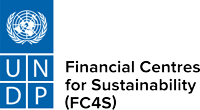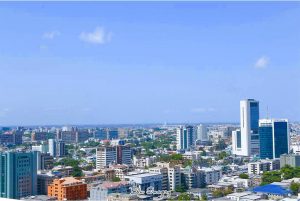Strong growth in sustainable finance but removing some barriers and more collaboration is needed – report
Geneva – The fourth annual State of Play report by the UNDP-hosted Financial Centres for Sustainability (FC4S) Network has identified several key areas where more focus is required to underpin progress around the sustainable finance agenda.
Overall, the report provides compelling evidence that financial centres’ initiatives were characterised by strong growth, increased scope, greater maturity and accelerated action across 2021. And with this year’s COP27 expected to focus on unlocking further capital in support of the transition, 2022 is shaping up to be an important year for financial centres and their sustainable finance activities.
The report, ‘Leading Financial Centres Stepping Up Sustainability Action’, is published today Monday, 28th February.
This year’s assessment, which surveyed 29 financial centres around the globe, reveals seven key insights on how financial centres across all continents are mobilising their capital, resources, connectivity, and expertise to support low-carbon transition and the achievement of the UN Sustainable Development Goals (SDGs). It also identifies the barriers they need to overcome to achieve these goals.
Key findings of the report highlight the need for:
- A Multistakeholder Approach and International Collaboration – Stakeholders’ heterogeneity within financial centres, with more than 70% of surveyed centres having significant private sector involvement, is critical to scaling up sustainable finance, as it enables systemic approaches. Also, international connectivity allows for the exchange of experiences and solutions.
- More and better data – over 60% of the 29 financial centres reported that data quality and availability are among the top barriers to scaling up sustainable finance.
- Standardization – 52% of respondents indicated that working towards consistency across the development of standards, taxonomies and guidelines is a top priority to their institutions.
- Professional development and education – 52% of financial centres surveyed reported that the lack of capacity and qualified workforce on sustainable finance is among the top barriers to scaling up sustainable finance. While an increasing number of training programmes at different levels have been reported, only 21% of financial centres have available all types of educational activities related to sustainable finance and only 28% and 35% percent reported having postgraduate and undergraduate courses related to sustainable finance available.
- Policy and regulatory engagement – 48% of respondents emphasised this as a top priority in 2022. The regulatory environment remains a critical driver of sustainable finance. This year, 27 out of the 29 sampled financial centres were home to at least one financial instrument or incentive implemented by public institutions, reaching at least 255 policies collectively.
- More options to scale up sustainable finance – 86% of financial centres reported barriers related to mobilising sustainable funds in this edition. Persistent challenges in this regard include the lack of sustainable project pipelines (40%) and the lack of supply of sustainable financial products (60%).
- Reliable commitments – The report noted concern around the quality and impact of market players commitments – almost three quarters of the 270 sampled market participants reported that they committed to mobilising finance for sustainability purposes, but only one quarter exclude companies engaged in fossil fuel activities.
Lamia Merzouki, Deputy General Manager Casablanca Finance City Authority and FC4S Co-Chair, said: “The assessment programme underpins FC4S global activities. It provides a snapshot of member progress and year on year priorities, which ensures FC4S allocates significant resources to support these. Noting the importance of the regulatory environment as a critical driver of sustainable finance, it is also an important tool for FC4S and our members to collectively engage with policy makers and regulators as we seek to accelerate the sustainable finance agenda in local markets, regionally and internationally. As we build towards COP27 this year, this engagement is key as we seek to mobilise increasing amounts of capital in support of the transition, while ensuring that private sector commitments and pledges are delivered.”
Jennifer Reynolds, CEO Women Corporate Directors Foundation and FC4S Co-Chair, said: “In recent years, the world has witnessed rapid growth in green and sustainable finance activities. However, at around 10% in some large economies, its proportion in total global financing remains low. The FC4S assessment programme helps members to address and prioritise the areas most needed to increase the scale of sustainable finance activities, while ensuring that the potential for green washing is minimized, thus underpinning the reputation, and functioning of the green and sustainable finance market.”
Stephen Nolan, Managing Director of Financial Centres for Sustainability, said: “Many emerging markets and developing economies are at the beginning of their green and sustainable finance journeys, have significant exposure to physical climate risks, and face greater inequality. As noted by the G20, implementing financial solutions to address the dual climate financing and sustainability gaps is necessary. By understanding their baseline, the FC4S annual assessment programme supports members ambition and supports targeted action.”
You can download a copy of the report here
For further information please contact:
Florencia Baldi, Head of FC4S & SIF Knowledge Hub at florencia.baldi@undp.org










































